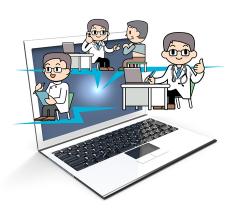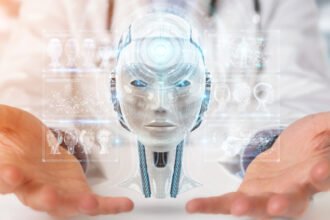When Amazon first came out with a smart recommendation algorithm for customers, millions of consumers receive their first tailored shopping experience personalized to their own interests. This changed the consumer world and introduced us to a whole new era of shopping.
Amazon’s algorithms, using a method called “item-to-item collaborative filtering”, are able to provide targeted shopping recommendations by creating a personalized experience for each person. Even in a very basic form, this was the beginning of using machine learning in a very practical manner.
But can such artificial intelligence and machine learning also act as an enabler for changes in medicine and healthcare, as much as Amazon’s algorithm changed consumerism?
A Difficult Start for AI
Artificial intelligence has not been popular lately. Leading thinkers have attacked the concept—Stephen Hawking and Bill Gates have both voiced their concern. In a BBC interview, Hawking explains that the development of full artificial intelligence could spell the end of the human race.
Some people in medicine, however, don’t think that way. It’s worth a look at different alternatives and use cases of how artificial intelligence could potentially bring value to the process of healthcare delivery and the treatment of diseases. Which options the healthcare community would then embrace is up to health leaders and patients to decide.
AI and Healthcare
The strongly regulated healthcare industry has made little use of artificial intelligence so far. One of the problems has always been that healthcare is too complex. In order to predict anything around one’s health, we need information on demographics, proteins, multi-gene interactions, environmental effects, and a whole host of other facets, writes Rebecca Harrington in Popular Science.
But that could be changing. Last month, software company IBM announced its plans for a deal with Merge Healthcare. For IBM, it could open up huge possibilities to use artificial intelligence in medicine, as the Wall Street Journal reports.
Those possibilities are startling and exciting:
1. AI to predict drug resistance
Could AI predict healthcare outcomes? Researchers are working on ways to use AI and machine learning to predict responses from two chemotherapy medications used to treat breast cancer patients. The underlying problem is that not everyone with the same cancer responds in the same way.
Peter Rogan, a professor at the University of Western Ontario, reports that artificial intelligence is a powerful tool to predict drug outcomes because it looks at the sum of all the interacting genes. The results of Rogan’s team have been published in the journal Molecular Oncology. They found it was possible to predict which women with breast cancer would experience improvements when using the drug Paclitaxel.
2. “Did you take your pill?” – How AI could support medication adherence
Can AI help to check whether we took our pills? According to MedCity News, a company in the US does exactly that. AiCure is a startup that uses artificial intelligence on patient’s mobile devices to confirm medication ingestion support in clinical trials and high-risk populations. How does it work? AICure’s HIPAA-compliant software captures and analyzes evidence of medication ingestion. A smartphone’s camera is used to understand whether patients took the medication correctly.
Real-time data is also centralized for immediate intervention and longitudinal tracking of adherence patterns. Research found that patient non-adherence to prescribed medications is associated with poor therapeutic outcomes, progression of disease, and causes billions of dollars per year in avoidable direct health care costs. Now, healthcare professionals only need to ensure that every patient makes use of his or her smartphone.
3. AI for smarter drug development
IBM Watson is probably one of the most well known examples of a supercomputer that has proven its abilities in AI beyond the lab. Besides answering questions for the quiz show Jeopardy, Watson is also able to understand and extract key information by looking through millions of pages of scientific medical literature and then visualize relationships between drugs and other potential diseases.
Last year, IBM announce that the pharmaceutical giant Johnson & Johnson and competitor Sanofi would engage in a collaboration with IBM Watson’s Discovery Advisor team. J&J’s goal is to teach the supercomputer to read and understand scientific papers that contain clinical trial outcomes, and then help to develop and evaluate medications and other treatments. While this may not sound too exciting, it could have incredible consequences on how pharmaceutical companies do comparative effectiveness studies.
The IBM statement suggests that it could help doctors to match a drug with the right set of patients in order to maximize effectiveness and minimize side effects. This would be different to the manual process currently applied, which requires months to find data and evidence before a study can even start.
The use of Watson could significantly reduce the time, and thereby accelerate the process of discovery. MedCityNews reported that this was the first public announcement of pharmaceutical companies to embrace a supercomputer’s abilities and use it for predictive analytics towards drug development.
4. AI for Alzheimer’s Patients
A project conducted at the University of Washington and its department of Computer Science explored the use of AI systems to support and enhance the independence and quality of life of Alzheimer’s patients. Such assisted cognition systems would make use of AI technology to replace some of the memory and problem-solving abilities that have been lost by an Alzheimer’s patient. According to the researchers, the motivation for this project stems from the need to promote the well-being and independence of people suffering from cognitive limitations due to aging and Alzheimer’s disease.
5. AI for Wearable Health
A problem with Internet of Things (IoT) applications has been how to make use of their data, as computers quickly reached a limit of what could be done with all that was collected.
Thankfully, machine-learning systems have adapted to handle larger capacities of incoming data. Zulfi Alam, general manager for personal devices at Microsoft, explains in a post that their smart upcoming algorithms will know enough about the user and her biometrics in a steady state to be able to recognize patterns and opportunities to improve user health and fitness.
In a more critical healthcare setting, a research team at the University of California, Los Angeles, proposes a platform for health monitoring using wireless sensor networks. The platform’s architecture is a network-enabled system that supports various wearable sensors and contains on-board general computing capabilities for executing individually tailored event detection, alerts, and network communication with various medical informatics services.
Imagine this monitoring platform connected to artificial intelligence and machine learning capabilities, and the way we take care of patients in the future could significantly change.
What does the future hold?
Healthcare professionals seem to be skeptical about the use of artificial intelligence in their practice. Above we presented a few use cases where AI could add value to healthcare, especially in areas where it could excel beyond the abilities of humans. Yet, AI is still in an infant stage of development and will not be able to replace a doctor, writes Daniela Hernandez of Kaiser Health News in WIRED.
The big question we may want to ask is, ‘How can machine learning become a greater enabler for healthcare and its participating players?’ The time is right to ask doctors and pharmaceutical companies what problems they have, and how AI could help solve them.









